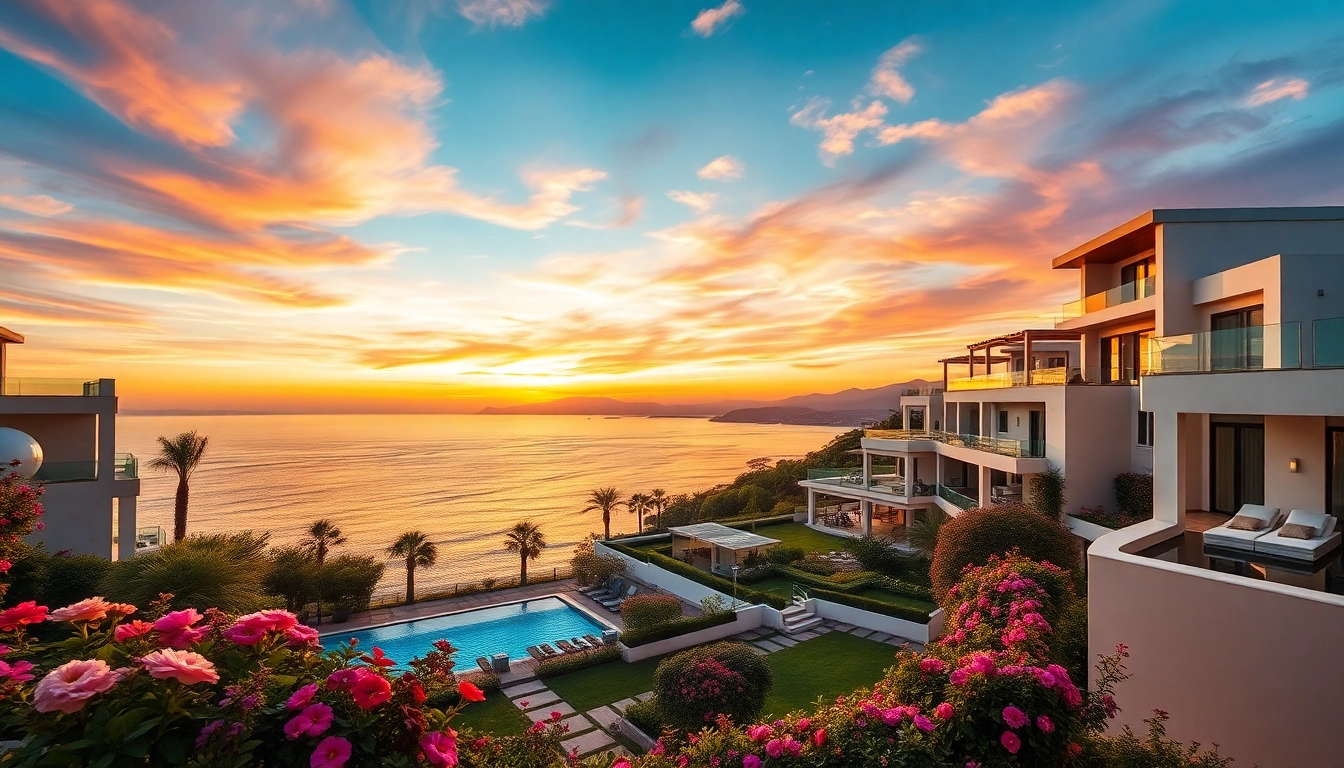Understanding Luxury International Real Estate
What Defines Luxury International Real Estate?
The term luxury international real estate encompasses a wide variety of high-end properties located in desirable locations across the globe. These properties often exemplify exceptional design, architecture, and a range of features and amenities that attract affluent buyers. Luxury properties are typically characterized by elevated price points, often in the millions of dollars, and cater to a clientele that values exclusivity, aesthetic appeal, and prime real estate locations.
Defining luxury in real estate is subjective; however, some common indicators include stunning views, exceptional locations (like beachfront or urban centers), historical significance, high-quality construction, and distinctive architecture. Luxury properties may also offer unique features such as private pools, expansive gardens, concierge services, or proximity to elite social activities such as gourmet dining, art galleries, and shopping districts.
Key Characteristics of Luxury Properties
Investing in luxury international real estate requires an understanding of its key characteristics. Here are the main features to look for:
- Prime Location: The location significantly affects a property’s luxury status. Areas with scenic beauty, prestigious address, and accessibility to cultural or social hubs are highly sought after.
- Architectural Design: Unique and innovative designs often set luxury properties apart. Classic or contemporary designs that highlight the property’s location can enhance its appeal.
- Quality of Construction: High-end materials and expert craftsmanship are hallmarks of luxury properties. Buyers expect attention to detail in every part of the home.
- Exclusive Amenities: Luxury homes often come with high-end amenities such as home theaters, wine cellars, spa facilities, smart home technologies, and expansive outdoor spaces.
- Privacy: Many luxury buyers seek properties that provide privacy and security, often featuring gated entrances and advanced security systems.
Why Invest in Luxury International Real Estate?
The appeal of investing in luxury international real estate extends beyond personal enjoyment. Here are several compelling reasons why affluent investors focus on this market:
- Wealth Preservation: Luxury real estate is often viewed as a stable investment that can preserve wealth during economic downturns. Tangible assets like property generally retain value better than liquid investments.
- Portfolio Diversification: Adding international properties can diversify investment portfolios and reduce risk. Different geographical markets often react independently to global economic trends.
- Rental Income Potential: High-end properties in coveted locations often attract long-term tenants or vacation renters, providing a lucrative source of passive income.
- Tax Benefits: Real estate investors may take advantage of various tax deductions associated with property ownership, such as depreciation, mortgage interest, property taxes, and potential 1031 exchanges in certain jurisdictions.
- Personal Enjoyment: Beyond investment returns, luxury properties provide personal enjoyment and lifestyle benefits, whether for family vacations, retirement, or a second home.
Market Trends in Luxury International Real Estate
Current Trends Shaping the Luxury Market
The luxury real estate market is continuously evolving, influenced by economic conditions, societal changes, and technological advancements. Recent trends include:
- Sustainability: More than ever, buyers prioritize eco-friendly homes equipped with green technologies—like energy-efficient appliances, sustainable materials, and systems to reduce water usage.
- Remote Work Opportunities: The rise of remote working has driven interest in properties outside urban cores, focusing on locations with natural beauty and spacious accommodations.
- Smart Home Technologies: Interested buyers appreciate features that incorporate advanced technology for security, convenience, and energy management, enhancing the overall luxury living experience.
- Wellness Architecture: Luxury buyers increasingly seek homes designed with wellness in mind. Features could include home gyms, yoga studios, and designs focused on natural light and airflow.
Impact of Global Economic Factors
The luxury international real estate market is often affected by fluctuating global economic factors. Key elements include:
- Interest Rates: Low-interest rates tend to encourage luxury investments, making mortgages more attractive for high-net-worth individuals.
- Foreign Currency Exchange: Economic conditions affecting currency values can impact purchase decisions for international buyers, making properties more or less expensive based on exchange rates.
- Global Political Stability: Investors seek stability. Regions experiencing political instability may see decreased interest, while stable countries often attract foreign investments.
Emerging Destinations for Luxury Real Estate
New emerging markets are continuously gaining traction among luxury real estate investors. Destinations that have witnessed increased interest include:
- Lisbon, Portugal: Known for its stunning architecture and relatively affordable luxury properties, Lisbon has become a hotbed for international investors.
- Mediterranean Locations: Countries such as Spain and Greece offer beautiful coastal properties with luxurious amenities, attracting sun-seeking buyers.
- Asia-Pacific Region: As economies grow, countries like Vietnam and Thailand offer promising luxury real estate markets with cultural charm and beautiful beaches.
Strategies for Investing in Luxury International Real Estate
Identifying Promising Properties
Choosing the right property requires significant research and strategic evaluation. Here are some steps you can take:
- Conduct Market Research: Thoroughly analyze market trends, property values, and rental demand in potential locations.
- Engage Local Experts: Utilize local luxury real estate agents or consultants who understand market nuances and can guide buyers in their choices.
- Evaluate Property Condition: Consider properties requiring minimal renovation versus those that may require extensive repairs, as this can affect the total investment cost.
- Inspect for Authenticity: Ensure that luxury properties have valid documentation, including title deeds and certificates of authenticity, to avoid potential legal complications.
Financing Options for Luxury Investments
Financing a luxury real estate purchase can pose its own set of challenges. Options include:
- Luxury Mortgages: Specialized lenders provide mortgages tailored for high-net-worth individuals, often with better terms and lower interest rates.
- Cash Purchases: Given the affluent nature of luxury buyers, many often opt for cash purchases, allowing for quicker transactions without the delays associated with mortgage approvals.
- Joint Ventures: Partners may pool resources to invest in higher-value assets, particularly appealing for international investments where local knowledge is beneficial.
Legal Considerations in International Transactions
Engaging in international property transactions requires careful navigation through various legalities:
- Understanding Local Laws: Different countries have diverse regulations concerning land ownership, foreign investment, and property taxes.
- Engaging With Legal Experts: It’s critical to enlist legal professionals with expertise in international real estate to navigate contracts and ensure compliance with local laws.
- Title and Property Rights: Investigate property titles to ensure there are no disputes, liens, or encumbrances, simplifying the process for a smooth transaction.
Challenges in the Luxury International Real Estate Market
Market Volatility and Economic Risks
Despite its allure, the luxury real estate market isn’t devoid of risks. Investors should remain cognizant of:
- Economic Downturns: Economic shifts can belatedly impact the luxury sector, leading to decreased property values in softer markets.
- Over-Saturation: Certain locations may experience a surplus of luxury properties, leading to price competition and reduced returns.
- Changing Buyer Preferences: Fluctuations in buyer priorities (like sustainability or technology) may affect property demand and necessitate quick adjustments.
Navigating Different Legal Frameworks
Complex legal structures can be challenging when investing internationally. Addressing this involves:
- Thorough Research: Understanding the legal context of the market you are entering, including ownership rights and bureaucracy.
- Expert Guidance: Utilize local experts who possess knowledge of prevailing laws and can assist in navigating contracts, permits, and local regulations.
Maintaining Luxury Property Value
Maintaining a luxury property’s value is essential for long-term investment yields. Strategies to consider include:
- Regular Maintenance: Keeping properties well-maintained prevents dilapidation and ensures they remain competitive in the market.
- Continuous Upgrades: Implementing the latest luxury features, technologies, and style trends can enhance desirability and longevity.
- Strategic Marketing: Marketing properties effectively can enhance visibility and attract potential buyers, sustaining or increasing value.
Future of Luxury International Real Estate
Predictions for Market Development
The future of luxury international real estate is poised for significant transformations. Predictions include:
- Sustainable Development: The demand for eco-friendly and sustainable properties will continue to skyrocket, influencing standards in design and construction.
- Changing Demographics: As younger, affluent buyers enter the market, preferences may shift towards modern design, tech integration, and wellness spaces.
Technological Innovations in Real Estate
Technology will play an increasingly critical role in shaping the luxury real estate landscape. Emerging innovations include:
- Virtual Tours: Virtual reality technology is transforming how buyers explore properties, allowing for immersive experiences without physical visits.
- Blockchain Technology: Blockchain holds the potential to enhance security, streamline transactions, and increase transparency, offering an innovative approach to property transfers.
How Buyers’ Preferences are Evolving
Understanding preferences of modern luxury buyers is essential for real estate investors. Current trends indicate:
- Simplicity and Minimalism: Modern buyers often gravitate towards simple, minimalist designs that exude elegance while offering functionality.
- Health and Well-being: Increased focus on health has led to higher demand for properties that promote wellness—for instance, homes with fitness facilities, fresh air circulation, and natural materials.



